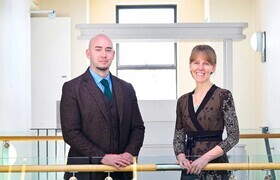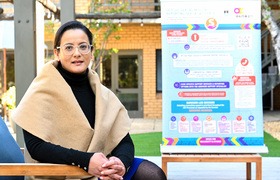Prof Ramugondo: a beacon of hope
15 October 2025 | Story Nicole Forrest. Photo Lerato Maduna. Read time 6 min.
University of Cape Town (UCT) Deputy Vice-Chancellor (DVC) for Transformation, Student Affairs and Social Responsiveness Professor Elelwani Ramugondo was honoured with the Beacon of Hope Award at the WomenCan Awards for the positive, meaningful and lasting change that she has made over the course of her career.
WomenCan is a platform focused on empowering, encouraging and inspiring all women to realise and use their power to foster a culture of transformation, development and empowerment in their personal and professional lives.
The movement is built on three foundational values – belong, connect and share – each of which reflects the network’s commitment to creating spaces where women feel at home, connect through shared learning and celebrate their stories to inspire others.
Although Professor Ramugondo is no stranger to receiving honours for her accomplishments, few of the awards she has received have held as much gravitas on a personal level as being named the WomenCan Beacon of Hope.
“At a public institution, we cannot demand legitimacy, we earn it.”
“Awards for academics, outside of those awarded by other academics, are few and far between. So, this is particularly meaningful because of the light it shines on the important work that people working at public institutions are doing,” she said.
“At a public institution, we cannot demand legitimacy, we earn it. I saw this recognition in that light and think it speaks to the impact that we are making and how that impact is felt.”
Making an impact, together
Throughout the course of her life and career, the deputy vice-chancellor has been driven by the principle of ubuntu, something that perfectly aligns with the WomenCan values.
“Ubuntu is such a compelling notion. It says – to borrow from the late Professor [Bongani] Mayosi – that you can’t celebrate success in a sea of failure. It is our duty to share what we have in terms of gifts and talents … to move forward.”
As the driving force behind UCT initiatives such as The Pitch, the Centre of Wellbeing and Flourishing, and the production of the “Transformation: A Humanising Praxis”, an upcoming special issue of the Transformation in Higher Education journal, Ramugondo has done more than merely pay lip service to this theoretical framing of transformation.
“Transformation as a humanising praxis is something that I brought with me to my role at UCT and it’s a vision that has, fortunately, been embraced by many. When we view transformation through this lens, we can create a sense of belonging, connect with ourselves and others, and share the gifts that we have,” she added.
“That is what enables us to affirm our humanity and claim legitimacy to make the greatest impact in our community and the world at large.”
Truth vindicates
In addition to being a relentless force for good, Ramugondo has a remarkable way of igniting hope and inspiration in others. This is in no small part thanks to her pioneering spirit and fearlessness when it comes to breaking down barriers faced by others.
“As a woman and a black woman leader, I have had to confront ‘invisibilisation’ and misrepresentation in the public eye. On one hand, I’m not ‘seen’ and my voice doesn’t matter, but on the other, what I do say and stand for is sometimes misrepresented,” she explained.
While this has the potential to create a great deal of discontent and frustration, the deputy vice-chancellor rather chooses to tackle these challenges head-on, in the belief that truth ultimately vindicates. “I default to dealing with the facts. No matter what’s being said or shared, I want to focus on dealing with the facts and putting the facts out there.”
Deep reflections
Of course, there are circumstances where the facts are not always brought completely to light. In these instances, Ramugondo bows her head to make sense of the bigger picture.
“Prayer is also a big part of my life. I’m not a churchgoer, but I believe in speaking to the Creator. It’s an ongoing conversation and I find that by acknowledging that there is something bigger than me, it calms my mind and grounds me.”
“A spiritual grounding brings some humility. It moves us away from the colonial academic notion that the mind can conquer all.”
She added: “A spiritual grounding brings some humility. It moves us away from the colonial academic notion that the mind can conquer all, which creates a false sense of superiority that has the propensity to become extremely dangerous, and conceals the harm that comes with conquering others.”
According to the professor, it’s these quiet moments of reflection that future leaders should be focused on cultivating over busy schedules, crammed calendars or never-ending entertainment.
“Protect the moments of silence with everything you’ve got. Had I done that, as my younger self, I believe I would have connected earlier with my authentic self. Silence allows for an internal dialogue to emerge, for you to have a conversation with yourself – and that’s where you truly find liberation.”
Laugh out loud
The role of deputy vice-chancellor, especially in the transformation, student affairs and social responsiveness realm, is no laughing matter. However, Ramugondo noted that maintaining some sense of levity in all areas of life, no matter how challenging, is always an asset.
“I find that the humility that prayer brings also allows for humour; for the ability to be able to laugh when it seems that you should be crying. Laughing at oneself, because you know that you’ve made a mistake but it’s not completely catastrophic, allows you to forgive yourself and move on,” she said.
 This work is licensed under a Creative Commons Attribution-NoDerivatives 4.0 International License.
This work is licensed under a Creative Commons Attribution-NoDerivatives 4.0 International License.
Please view the republishing articles page for more information.










